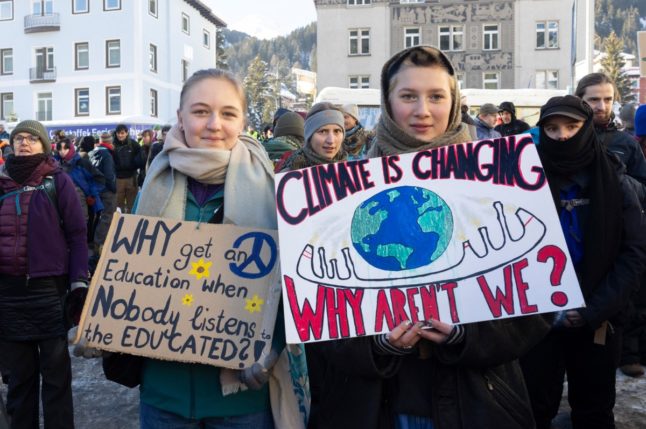In its annual ranking of 85 nations, US News & World Report has placed Switzerland in top position, based on 73 different criteria.
While it did not come up tops in all of the categories, Switzerland did sufficiently well in others to get an overall high score, as well as high scores in several individual categories.
In terms of quality of life, Switzerland ranks fourth, but it got high scores across nearly all the sub-categories. This is where the country ranks best — and not so good.
READ MORE: Switzerland ranked ‘best country’ in the world
Political stability (100 points out of 100)
Nobody can argue that Switzerland merits to get such high marks in this category.
The country has not been involved in any wars, unrests or upheavals in recent history, protected in large part by its neutrality and pacifism.
It is also politically stable from within, with well established democratic processes — such as referendums — providing security against abuses of power.
Economically stable (100)
Switzerland’s economy has withstood the Covid crisis far better than many other countries, and continues to be strong, partly due to an inflation rate that is far lower than in eurozone nations.
The reason is that Switzerland “combines world class governance with high levels of social capital and high social resilience. It also had strong financial systems, manageable debt levels and good health system resilience”.
READ MORE: Swiss post-Covid economic recovery ‘fourth best in the world’
Safety
Various surveys have shown that Switzerland is among the top-10 safest countries in the world, and one even rated it the safest in 2022.
This is not to say that there is no crime in Switzerland, but the rate, especially of violent infractions, is relatively low in comparison to other countries.
Even large cities, though more risky than small towns and rural areas, are not crime-ridden.
READ MORE: Switzerland ranked one of the world’s ‘safest countries’
A good job market (92.2)
Switzerland’s unemployment rate has been lower than in many other countries for decades, and it recovered quicker than others from the slowdown that occurred during the pandemic.
Currently, the unemployment is 2.1 percent, versus 6.6 percent across the EU.
There are now 15.6 percent more job vacancies in most industries than at the same time in 2021.
Family-friendly (85.4)
Parents of small children who are trying to find affordable daycare in Switzerland may disagree with this assessment, as these services are expensive and good facilities may be hard to find.
However, there are plenty plenty of benefits for children and families as well.
According to The Local’s reader survey, Switzerland offers an abundance of outdoor activities, the children are safe — whether playing outside or walking to school — and both good healthcare and education system are a plus as well.
Income equality (85.2)
In this category, Switzerland is in the 5th place in the US News & World Report survey, right after the Scandinavian countries.
While there is data showing that gender gap exists when it comes to pay, a study by the Federal Statistical Office shows that income distribution (between the highest and lowest earners) is fairer in Switzerland than in many other nations.
Public health system (84.7)
Although very expensive with costs increasing each year, in terms of quality and access to care Switzerland’s system is among the best in the world.
Like much of the European Union, Switzerland has a universal health system. However, The system here is fundamentally different in that it is not tax-based or financed by employers, but rather by individuals themselves.
Everyone must have a basic health insurance coverage and purchase it from one of dozens of private carriers.
The system is generally efficient, has an extensive network of doctors, as well as well-equipped hospitals and clinics.
Patients are free to choose their own doctor and usually have unlimited access to specialists. Waiting lists for medical treatments are relatively short.
READ MORE: How is Swiss healthcare system different from the rest of Europe?
Public education system
Switzerland has 12 publicly funded universities (10 cantonal universities and two federal institutes of technology), and a number of public Universities of Applied Sciences.
According to The QS World University Rankings, “Switzerland has the “third best university system in the world”.
The country also excels in vocational training —a three-year, dual-track programme that includes two days in a vocational school and three days getting an on-the-job training in their chosen sector (the so-called apprenticeships).
It includes a variety of fields such as business and commercial, administration, retail, tourism, construction, information technology, arts, wellness services, as well as various trades — in all, 230 professions.
This programme “enjoys very strong support from Swiss employers, who credit it with being a major contributor to the continuing vitality and strength of the Swiss economy”
READ MORE: Why is vocational training so popular in Switzerland and how much can I earn?
These aspects all contribute to the high score Switzerland obtained for its quality of living.
Not great for affordability
However, there is one negative category in the ranking as well, and it is not difficult to guess what it is: affordability, in which Switzerland’s score is…2.7.
It comes as no surprise to anyone living here (and a shock to tourists and new arrivals) that Switzerland’s cost of living is among the highest in the world, and especially in the country’s two largest cities, Zurich and Geneva.
Everything from food and clothing to housing and public transportation is more expensive than in the EU, with the exception of electronics and lower taxes.
However, there is also another way to look at this phenomenon: that Swiss salaries, which are higher here than in the eurozone, and low inflation rate, offset the prices.
READ MORE: Do wages in Switzerland make up for the high cost of living?



 Please whitelist us to continue reading.
Please whitelist us to continue reading.
Member comments